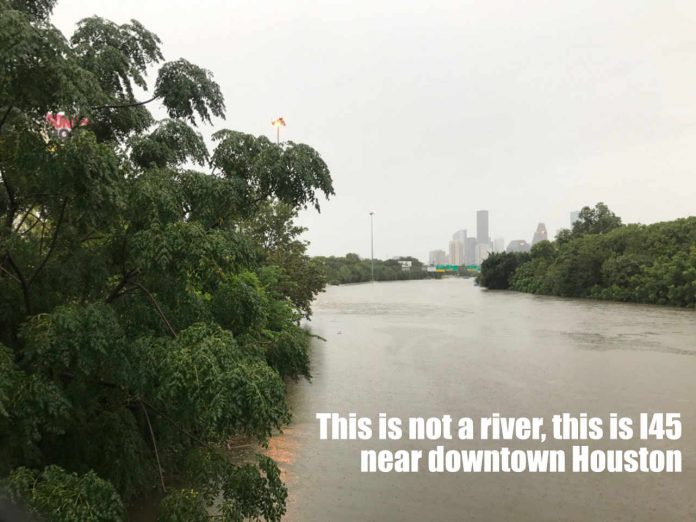On more than one occasion a question has been raised, why wasn’t Houston evacuated? Some say Harvey is comparable to Katrina; others say the monstrous hurricane came with flooding on a Biblical scale.
Harvey will go down as a record setter, and a hurricane that brought roughly 20-25 inches of rain. The category four storm rocked texas but questions remain as to why Houston wasn’t evacuated like other low-lying regions. A differing message from both the Mayor and the Governor could mean the difference between life and death in a scenario like Harvey.
[fvplayer src=”https://player.vimeo.com/external/231309906.hd.mp4?s=e2dbeb0af5c21dccfae6cde96ba8280c22906946&profile_id=174″ splash=”https://christianjournal.net/wp-content/uploads/2017/08/texas-flag.jpg”]
Politics has no place in a disaster, yet countless times politicians seek to use events and natural disasters for personal gain, such was evidently clear throughout the Obama administration, and such was also evident during Harvey. Just before the initial surge a conflict surfaced between the Democratic Mayor of Houston and the Republican Governor of Texas.
Gov. Greg Abbott stated; “Even if an evacuation order has not been issued by your local official, if you are in areas between Corpus Christi and Houston … you need to strongly consider evacuating,” Abbott said mid-day Friday in a basement bunker at the state emergency operations center in Austin.
Mayor Sylvester Turner, soon responded; “There are a number of people who are in Hurricane Harvey’s direct path, and evacuation orders have been given to them,” Turner said. But for the Houston area, “This is a rainmaker for us. There’s no need for people to be thinking about putting themselves in greater danger.”
Local officials in Houston are most likely concerned about conducting a mass evacuation because in 2005 when Hurricane Rita struck it caused gasoline shortages, massive traffic jams, and gridlocked highways. At least 120 people died, including 23 who were killed in a bus crash near Dallas.
With that in mind, local officials most likely attempted to prevent a similar scenario. However, the immense flooding that has taken place in Houston is evidence that an evacuation order was warranted. In addition, since 2005 all of the evacuation plans had been updated. Regardless of such, Texans and Federal officials are doing the best they can to alleviate the fallout from Hurricane Harvey.
Such an emergence of politics in a crisis like hurricane Harvey is alarming because there are lives at stake, yet continually and increasingly over the last several years there has been an uptick in political agendas playing a role in disasters.
The difference between Hurricane Rita and Hurricane Harvey is after Rita, many in Houston returned to their homes after hours of languishing on the highway “and found the house was fine and the street wasn’t flooded,” according to Madhu Beriwal, the president and CEO of IEM, a disaster planning, and prevention company who has worked in Harris County.
However, as of right now, Houston is under feet of water and has received what officials call the worst disaster the state of Texas has probably ever seen.
Regardless of such, the people are working to save each other. Taking matters into their own hands and connecting on social media, asking for or offering help. They launched private boats and kayaks. They carried people to higher ground. “You’re seeing rescues from very expensive, high-end to very low-rent apartments,” said West Houston business owner Jody Goldstein, 51. “It’s hitting people equally.”
“Catastrophic flooding in the Houston metropolitan area is expected to worsen,” the National Weather Service said Sunday. It added: “This event is unprecedented and all impacts are unknown and beyond anything experienced.”
After the initial hit, Harvey is expected to linger for a bit longer and bring in up 24 more inches of rain through Friday. Houston is already flooded, and with more rain on the way, things may get worse.
“What we’re seeing is the most devastating flood event in Houston’s recorded history,” said Steve Bowen, chief meteorologist at reinsurance firm Aon Benfield.




![[VIDEO] Drag Queen Drag Shows Are Now Infesting Churches](https://christianjournal.net/wp-content/uploads/2019/11/Screenshot-2019-11-22-at-9.02.01-PM-218x150.png)


![[VIDEO] Drag Queen Drag Shows Are Now Infesting Churches](https://christianjournal.net/wp-content/uploads/2019/11/Screenshot-2019-11-22-at-9.02.01-PM-100x70.png)


